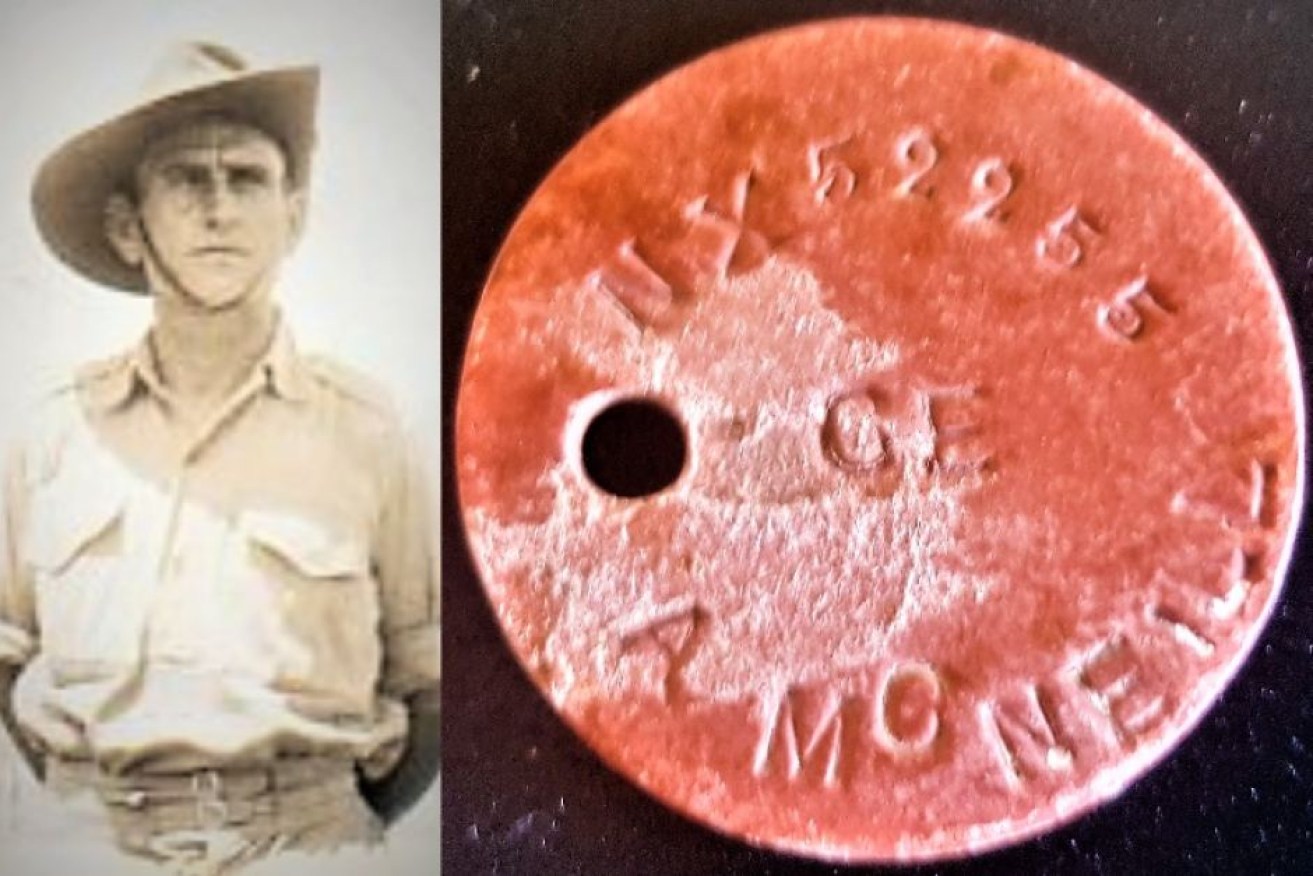ANZAC ‘miracle’ as family regains WWII keepsake after 70 years
A dog-tag dating back to the Second World War has miraculously made its way back into family hands after going missing for almost 70 years.

Andrew McNeill (l) and his dog-tag, found after 70 years. (Supplied)
When builder Robin McNeill was renovating a home in Reid, in Canberra’s inner north, last year, he pulled at the mantle-piece sitting above the fireplace.
He watched what he thought was debris flutter to the ground, before the electrician he was working with did a double-take.
“The electrician that was there recognised it was a dog-tag, picked it up, and that’s when we realised we had found something a little special,” Robin said.
Indeed, just how special this discovery was would materialise over the coming months, surprising everyone involved.
For a start, the dog-tag was branded with the number ‘NX52255’ and the name ‘A McNeill’ — coincidentally, the same name as builder Robin’s dad and his son.
“It took me by surprise,” he said.
“I didn’t know what to think right then.”
Robin, along with his dad, mum and sister and the new owner of the Reid home, contacted the Australian War Memorial.
Soon, they and war researchers across Canberra began connecting the pieces and filling in the story.
Joining the dots
The dog-tag belonged to Andrew McNeill, who served in WWII before being captured as a prisoner of war in Singapore in 1942.
Upon returning to Australia from the war, Andrew McNeill moved into the Reid house, which he ended up living in for the rest of his life.
For his grandchildren Toni, Darrell and Colin McNeill — along with their late brother Terry and their cousin Kay — finding out more about their late grandfather’s war service had been a lifelong priority.
“As far as his war service, it was something he never spoke about,” Darrell said, calling the discovery of the compressed cardboard dog tag “amazing”.
“How it survived 60 years in a house is unbelievable,” he said
“And how it survived three years in a prisoner of war camp … around his neck with the humidity, where many didn’t.
“So it’s pretty amazing it survived this long, 70 years.”
Added granddaughter Toni: “It’s a piece of our grandad that he carried with him all the time when he was a prisoner of war — it’s a very special thing for us.”
From Scotland, to Canberra, to war
Andrew McNeill, better known as Andy to his family, was born at Clydebank outside of Glasgow, Scotland, in 1904, before moving to Australia six years later — originally to Victoria.
Mr McNeill was the only one in his family to leave Victoria, moving to Canberra to be part of the construction of the first national parliament, now known as Old Parliament House.
He met and fell in love with Ethel Owen. They were married and had two sons, Owen and Doug.
Mr McNeill was part of the militia before enlisting in 1940 — where, as chronicled by his descendants, he “served with the 2/20 Battalion where he saw active fighting, and later the 22 HQ Brigade”.
At the fall of Singapore in early 1942, Mr McNeill was captured as a prisoner-of-war and sent to Changi Prison.
He also spent time on the notorious Thai-Burma Railway, which was better known to diggers as “death railway” because of the brutal forced labour used to build it.When he returned home, Mr McNeill was a shadow of his former self, at one-point weighing just 38 kilograms.
“He lost something like 35, 40 kilograms — which is a lot of weight,” Darrell said.
“Given that he lived through horrors that we could not even begin to imagine, and came out the other end as such a good man, I think is the mark of extraordinary character,” Toni added.
“He was very caring and loving to his family, especially his grandchildren.”
And his grandchildren are moved by the efforts of everyone who chipped in to reconnect them with the precious dog tag.
“To be reunited with it after eight months of searching by those people is an extraordinary effort, and we are very grateful,” Toni said.
“It was like meeting old relatives, you just had a connection right away. It was really great.”
















